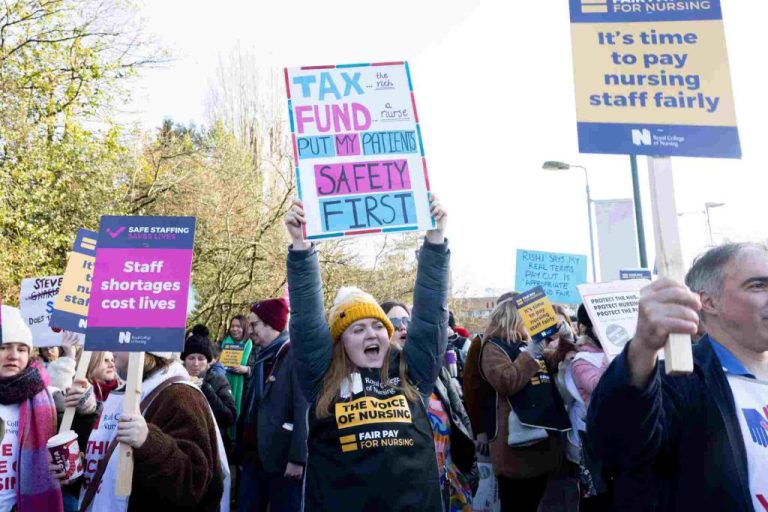Nurses are prepared to strike over an “insulting” 3.6% pay offer by the government, according to a campaign group.
On Thursday (22 May), health and social care secretary Wes Streeting announced the details of the 2025-26 Agenda for Change pay deal, having accepted the headline recommendations of the NHS Pay Review Body (PRB).
“There’s only so far you can push people before they say enough is enough”
Holly Turner
The deal means staff on Agenda for Change contracts in England, which include NHS nurses, midwives and others, are set to receive a 3.6% pay rise from August, backdated to 1 April.
An identical deal was issued by the Welsh Government, while Northern Ireland’s government has accepted the PRB recommendations but uncertainty remains about how the offer will be funded.
Meanwhile, nurses in Scotland were offered an 8% increase over 2025-26 and 2026-27, which this week received sign-off.
After the announcement of the deal on Thursday, unions representing nurses, midwives and other Agenda for Change staff strongly aired their dissatisfaction over the deal, with Royal College of Nursing (RCN) chief Professor Nicola Ranger describing it as “symptomatic of a broken system”.
Now, the RCN, the Royal College of Midwives (RCM), Unite, Unison and GMB are set to ballot members on the pay offer.
Should their members vote to reject it, the unions could issue a further ballot on industrial action, including strikes.
Holly Turner, a learning disability nurse from the East of England and founder of campaign group NHS Workers Say No, told Nursing Times her members were ready to strike over the deal.
She dubbed the 3.6% offer “insulting”, a “kick in the face” and accused the government of trying to drive a wedge between professional groups by giving doctors and dentists more.
“When you see the list of public sector pay rises, with us at the bottom, it does really feel insulting,” Ms Turner said.
“When Labour came in, they said ‘we’re the founding party of the NHS, we work on the founding principles of the NHS’… we’re not seeing that at all.”
NHS Workers Say No, Ms Turner said, was set to relaunch its #VoteReject campaign to encourage memebrs of the RCN to reject the pay offer.
The campaign was first deployed at the start of 2023 when, following strike action by nurses and subsequent negotiations with unions, the Conservative-run government issued an updated offer for the 2022-23 and 2023-24 pay deals.

Holly Turner
Referring to the 2025-26 pay deal, Ms Turner said: “I’d absolutely be willing to go on strike. I’ll be voting to reject the pay deal, and… I’ll be voting to go on strike.”
Ms Turner highlighted how she and her husband, who is also a nurse, had faced significant increases to their household bills and mortgage in recent months and years.
This year’s pay deal, she explained, would not do enough to ease the burden and called on the government to commit to pay restoration for nurses.
“We’re not seeing that at all,” she said.
“We know how much pay we’ve lost. Under austerity we had years of pay freezes, we’re back to getting pay awards and they go nowhere to restoring our pay to what it should be…
“How are we going to attract new people into nursing, and how are we going to retain skilled and experienced staff?
“There’s only so far you can push people before they say enough is enough.”
Helen Whyley, executive director of RCN Wales, said her members would decide the union’s next moves.
“As always, it is our members who will lead the way,” she said. “Their voice will determine our next steps.”
Helga Pile, Unison’s head of health, was asked on Sky News earlier today (23 May) about the likelihood of strike action.
She said: “That’s not a question for today. I think for today it’s really around trying to… send a message to government: ‘You have got some significant reforms you want to see delivered in the NHS – you have to bring the staff with you’.
“This pay award’s not going to help with this.”
Ms Pile said the PRB system was not fit for purpose, echoing similar criticisms other unions have levied since the announcement of the pay deal.
For example, Unite lead officer for health in Wales, Paul Seppman, said the PRB “doesn’t work” for members of his union.
RCM director for employment relations Joanne Kaye also did not comment on the appetite among members for strike action.
However, she said midwives would be “disappointed” that the 3.6% pay offer “barely covers” inflation, and that the union would be “discussing next steps and how we gauge members’ views on this pay award”.
Union consultative ballots on the deal are set to open soon in England and Wales. The results of these ballots will likely decide whether nursing strikes will be pursued.
The Department of Health and Social Care was contacted for further comment on the responses to the pay deal.

